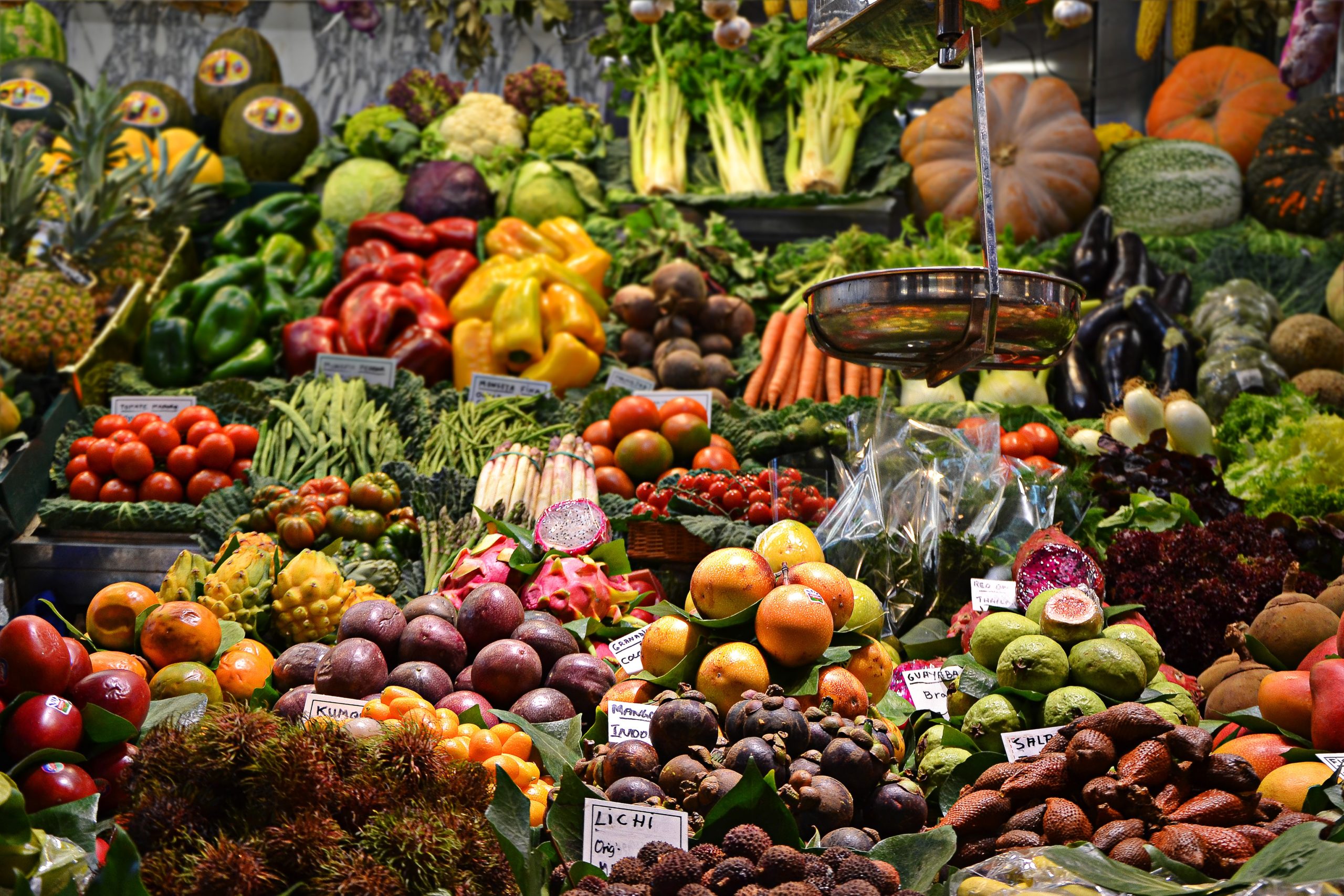
The importance of diet for eye health and vision has been known for a long time. Vitamin deficiencies are not uncommon, and it is known that deficiencies in certain vitamins can affect the health of your eyes.
Before we begin, it’s important to know one thing:
The human body is able to store certain vitamins and minerals, whilst others are excreted daily. The liver and other body tissues store fat-soluble vitamins, these stores are then available when there is a deficiency in the diet for a period of time. Whereas we excrete excess water-soluble vitamins daily and therefore need to replenish them daily.
With all of the health information and marketing out there, it can be difficult to know exactly what advice you should listen to. We’ve put together some useful information about various eye conditions and vitamins that are important for eye health, or there’s evidence that they may be important.
Happy reading!
Vitamin A

Why is it good for eye health?
Vitamin A plays a crucial role in maintaining a healthy outer surface of the eye. It’s also a precursor to rhodopsin – which is a protein found in photoreceptor cells in the retina. These are the cells responsible for detecting light and initiating the visual process. Vitamin A deficiency is very uncommon in developed countries but can commonly occur in third-world countries with widespread malnutrition.
Which eye conditions is Vitamin A important for?
A deficiency of vitamin A can cause a serious eye condition known as xerophthalmia. This causes damage to the eye surface, including the cornea, which can then result in permanent visual loss due to scarring. It can also cause night blindness due to its important role in the formation of rhodopsin.
There have been many studies into the effects of different vitamins and their role in common eye conditions. Some have proven to be beneficial, whilst others are less certain. Such as the Age-Related Eye Disease Studies (AREDS and AREDS 2) which has shown that nutritional supplements may be one of the most effective means available for delaying the development of end-stage age-related macular degeneration (ARMD). Beta carotene, which is an important provitamin A, is one of the components that was found to be beneficial. There are also studies suggesting that an increased intake of Vitamin A may also protect against loss of vision from cataracts.
Where can it be found?
You can obtain an adequate intake of Vitamin A from a normal diet and supplements aren’t normally necessary. Our bodies aren’t able to create Vitamin A so it must be consumed through food. This can be preformed Vitamin A, which is present in animal sources such as dairy, fish and meat (especially liver). Alternatively, we can convert provitamin A from plant sources such as sweet potato (kumara), pumpkins and sweet red peppers (capsicums) and green leafy vegetables.
Most fruits and vegetables that are red or orange in colour contain high amounts of beta-carotene which is an important provitamin A. In areas where Vitamin A deficiency is common, such as South East Asia and Africa, genetically modified and biofortified crops have been developed. This includes varieties of rice that contain increased amounts of vitamin A. Alongside other staple foods to try to increase the amount of Vitamin A in the populations’ diets. The use of supplements and diet diversification, can also greatly reduce the number of people affected by vitamin A deficiencies.
Vitamin A is fat-soluble, so it’s stored in the liver when there’s an excess and can then be broken down and used when there’s a shortage. However, taking excessive amounts of Vitamin A can be dangerous to your health and become toxic, this is usually due to too much preformed Vitamin A from supplements or medicines.
Vitamin E
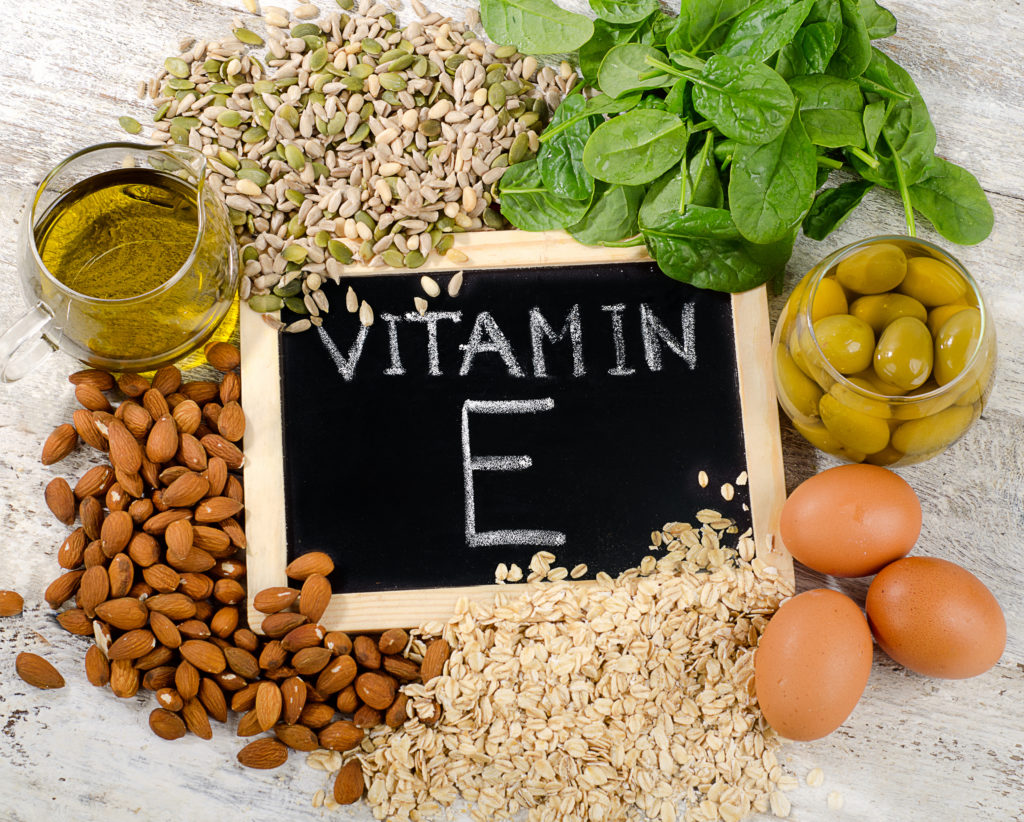
Why is it good for eye health?
Vitamin E is a potent antioxidant — a type of molecule which helps to soak up free radicals. Free radicals are harmful and unstable negatively charged molecules which cause damage to living cells, including those of the eye. Several eye conditions are thought to be associated with an imbalance between antioxidants and free radicals.
Which eye conditions is Vitamin E important for?
The AREDS studies, mentioned previously, have shown that taking Vitamin E in combination with several other supplements reduced the progression of age-related macular degeneration by 25%. There are several different formulations of tablets available which contain the appropriate vitamins and supplements based on the AREDS studies. You can talk to your GP, optometrist or ophthalmologist about these vitamins and supplements if you’d like to know more.
Where can it be found?
Foods containing polyunsaturated oils such as vegetable oils, nuts, seeds, and avocados are good sources of Vitamin E. It can also be found in smaller amounts in meat, fish and some fruits and vegetables. Most people get sufficient Vitamin E from a balanced diet. It’s fat soluble, so the body is able to keep stores of Vitamin E and use it as needed.
Vitamin C
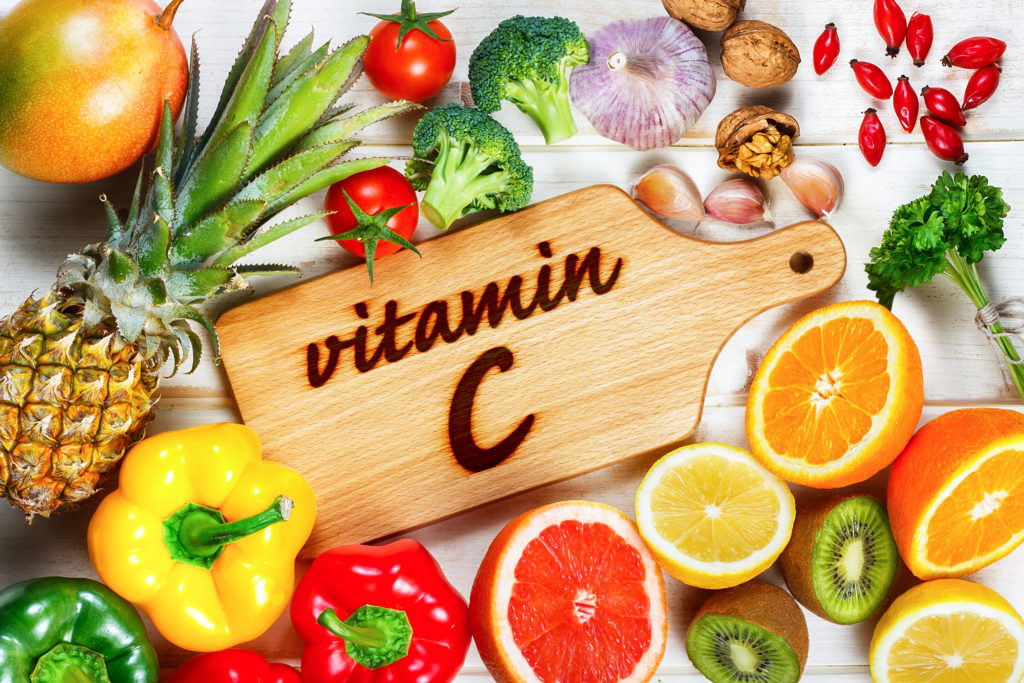
Why is it good for eye health?
Vitamin C is a potent antioxidant like Vitamin E. It’s required to make and maintain collagen, a vital component of connective tissue structures such as the skin, tendons and blood vessels. This is important for the eyes as collagen is in the cornea, which is the clear structure of the eye in front of the coloured part, the iris.
Vitamin C is also a component of supplements based on the AREDS studies mentioned earlier. This means it is shown to reduce the risk of advanced ARMD and associated vision loss.
Which eye conditions is Vitamin C important for?
The cornea has a crucial role in the focusing of the eye, so it’s important that it has strong collagen fibres to maintain its structure.
The delicate capillaries in the retina are also supported by Vitamin C, and along with other essential nutrients can slow the progression of ARMD. Several studies have also shown that an increased intake of Vitamin C may significantly reduce the risk of developing cataracts.
Where can it be found?
Vitamin C deficiency is extremely unlikely to occur in people eating a normal diet as fresh fruit and vegetables contain significant quantities. However, Vitamin C deficiency was a common problem in sailors before refrigeration was available. Their diets were very limited and largely deficient in fresh vegetables and fruit. After several weeks at sea, sailors would start to develop signs of a condition called scurvy in which the connective tissue starts to break down.
Humans are unable to produce or store Vitamin C as it’s water-soluble, although most other animals can, which is why it’s essential to get it from our diets. Some animals that can’t store Vitamin C, including humans, are the great apes, guinea pigs, capybaras and bats.
Although citrus fruits are most well known for containing Vitamin C, many other fruits and vegetables contain high amounts, such as yellow capsicums, kiwifruits, kale and broccoli. It’s just like your Mother told you – eat your fruit and vegetables!
Vitamins B6, B9 and B12
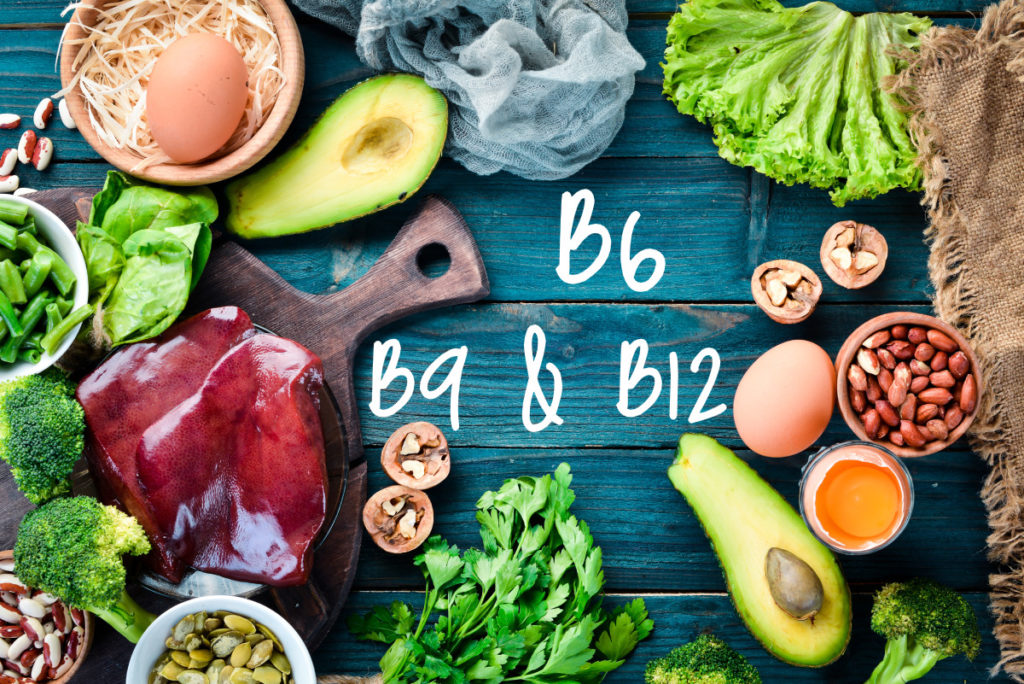
Why are Vitamins B6, B9 and B12 good for eye health?
Individually, these B Vitamins have different benefits, but when consumed collectively they have the best effect on the eyes. Studies have shown that this combination of vitamins can lower blood levels of a molecule called homocysteine. Elevated levels of homocysteine interfere with collagen structure, which is an important component of many of the eye structures, including the cornea, lens, sclera and vitreous body. As well as having damaging effects on retinal veins and arteries.
Which eye conditions are they important for?
Elevated homocysteine levels have been linked with venous and arterial occlusions, diabetic retinopathy and ARMD. Further research needs to be done to confirm whether there are strong benefits to taking supplements of these B vitamins or if an increase in Vitamin B rich foods would have similar effects.
Where can it be found?
Dairy products, fish, meat, and sweet potato all contain Vitamin b6.
Dark leafy greens, legumes, asparagus, beets and citrus fruits are good sources of folic acid or Vitamin b9.
Lastly, Vitamin b12 can be found in animal products such as meat, dairy and eggs. For those following a vegetarian or vegan diet, there are fortified foods such as cereals, nutritional yeast, and non-dairy milk.
Vitamin B2
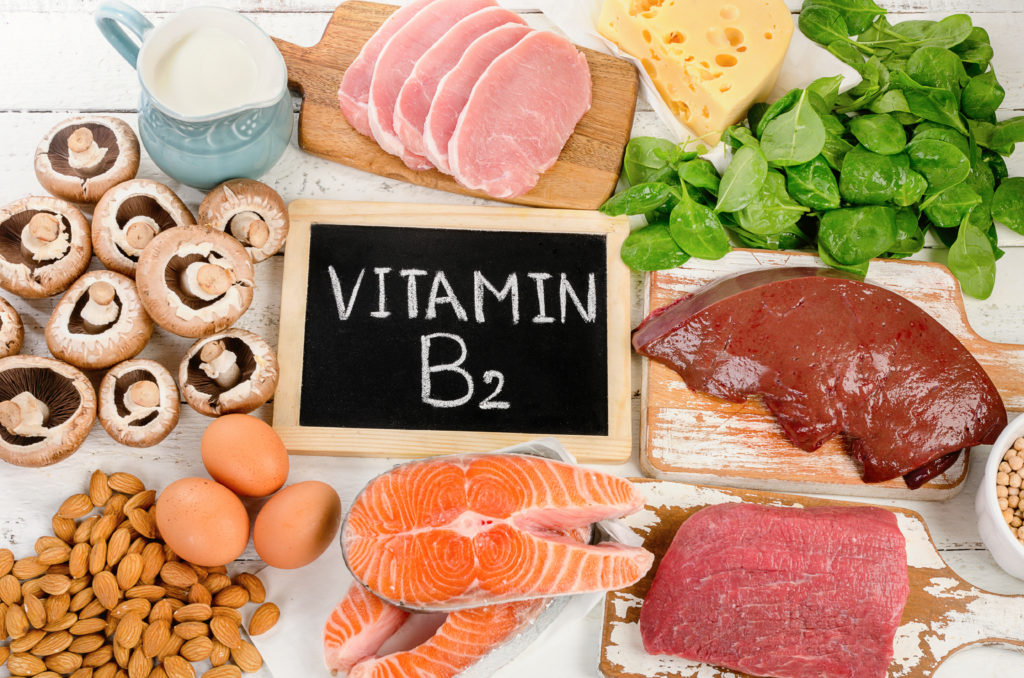
Why is it good for eye health?
Vitamin B2, also known as riboflavin, is an antioxidant like Vitamin C and Vitamin E and therefore, helps to protect the body against the damaging effects of free radicals. More specifically it helps to protect antioxidants in the eye.
Which eye conditions is Vitamin B2 important for?
There is evidence that riboflavin may reduce the risk of cataract development. One study has shown that an increased intake of riboflavin decreased the risk of cataract development. Whilst many studies have also shown that many people with cataracts are deficient in riboflavin.
Where can it be found?
Many foods contain high levels of riboflavin and a normal diet should provide adequate levels of vitamin B2. Good sources of riboflavin include oats, milk, yoghurt, beef, almonds, mushrooms and fortified cereals.
Vitamin B1
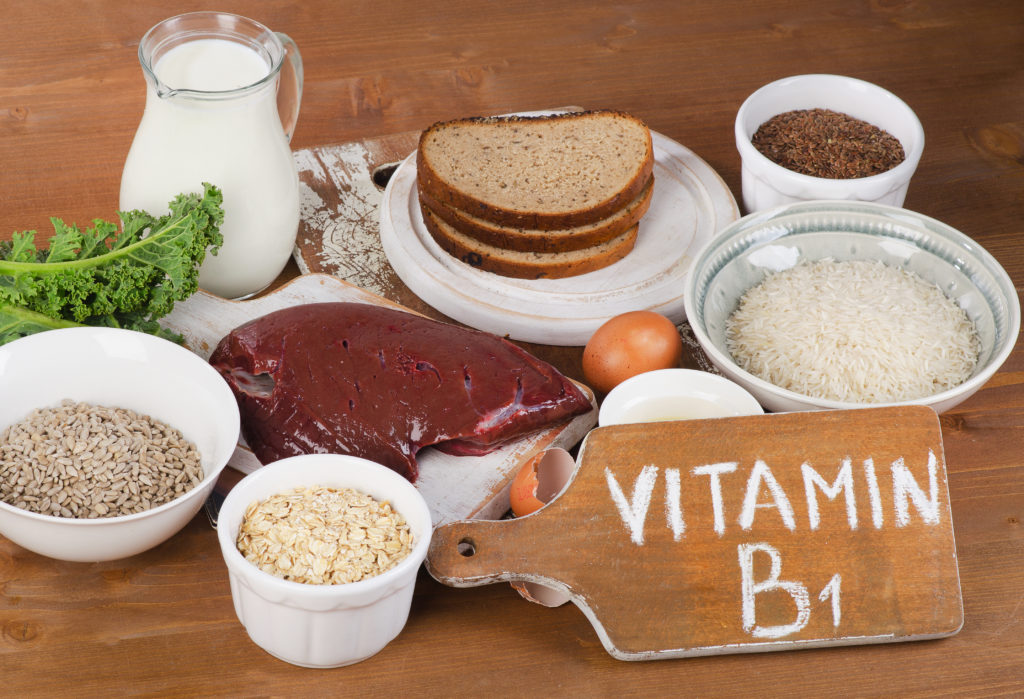
Why is it good for eye health?
Vitamin B1, or thiamine, plays an important role in normal cellular function and energy production. Thiamine deficiency is quite common in third-world countries with poor diets. It is particularly associated with the consumption of white rice, which has been processed to remove the outer coating of the rice grain that contains thiamine.
Thiamine deficiency is less common in the developed world but can occur with alcoholism, renal dialysis, and chronic diarrhoea. It may also be associated with a genetic condition where Vitamin B1 is poorly absorbed from the gut. A deficiency of Vitamin B1 can cause neurological damage including damage to the optic nerve.
Which eye conditions is Vitamin B1 important for?
Studies have shown that Vitamin B1 supplementation can reduce cataract development. It may also reduce the development of diabetic retinopathy, a potentially blinding eye condition which occurs in people with diabetes.
Where can it be found?
Food sources of Vitamin B1 include whole grains, pork, macadamia nuts and fish. It is often added to prepared foods such as breakfast cereals, bread, rice and pasta. Certain foods can also decrease the amount of thiamine in the body as they contain thiaminases – enzymes which destroy thiamine. Food products which contain thiaminases include tea, coffee, raw fish and shellfish. A deficiency in Vitamin B1 can be treated with oral vitamin supplements or injections of Vitamin B1.
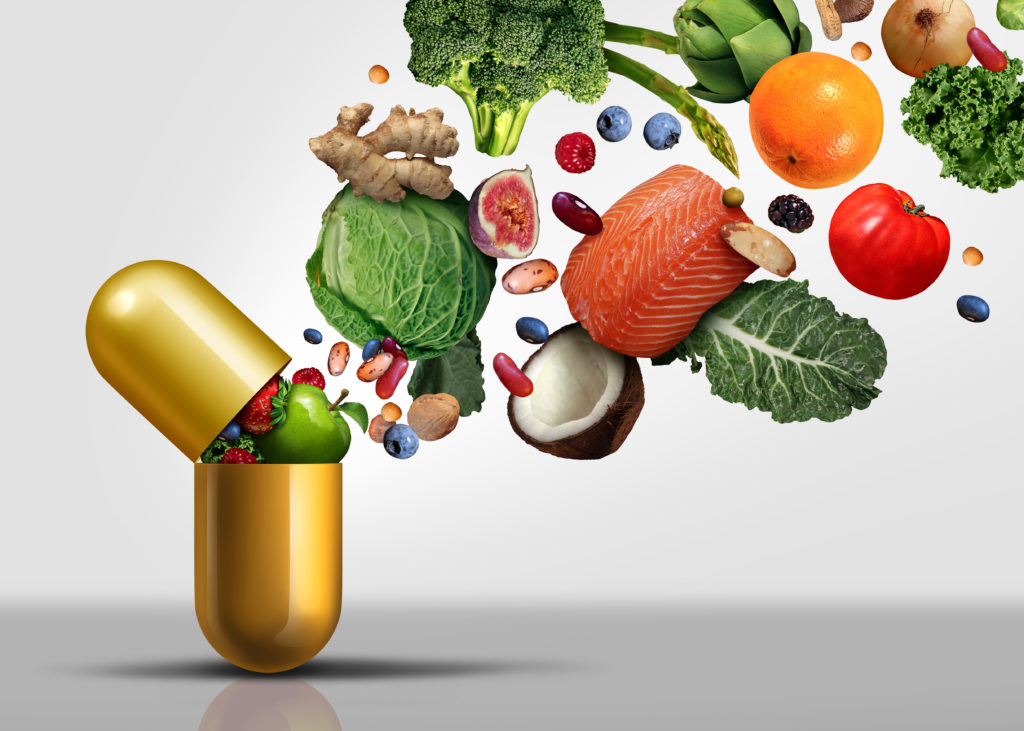
Multivitamins
Multi-vitamins usually contain all the essential vitamins that one would expect to get from a normal diet. They may also contain essential minerals. Several studies have found lower rates of cataracts among people who take multivitamin supplements.
A study on cataracts and the impact of nutrition was carried out in China on a population with poor nutrition. This was to determine the influence of using multivitamins for five years on the prevalence of cataracts. They ran two trials and found that there was a significant decrease in the risk of nuclear cataracts in the participants who were taking multivitamins. Several studies are currently underway to investigate whether multivitamin supplements affect the development of cataracts in non-nutritionally deprived populations and we may have a better idea of the benefits of multivitamins in the future.
Unlike cataracts, there’s currently no evidence to suggest that taking multivitamins supplements will reduce the onset or progression of ARMD.
High-dose antioxidant supplements
There are several supplements available which are marketed to prevent age-related eye diseases such as cataracts and macular degeneration. These supplements contain antioxidants such as Vitamin C, Vitamin E, carotenoids and zinc. There is some evidence to suggest that these supplements may delay cataract development as well, but the evidence is not very strong.
Unlike cataracts, there is good evidence that antioxidant supplements can benefit people with age-related macular degeneration. A medical study known as AREDS was carried out in the United States to determine if a specific high-dose antioxidant supplement was beneficial. The study showed that people taking this supplement had a significantly lower rate of progression of macular degeneration. Several formulations of antioxidant supplements based on the one that was used in the AREDS study are available from pharmacies or health stores in New Zealand.
Omega 3 supplements
There is significant evidence that dietary supplements containing omega-3 oils are beneficial for the management of dry eye symptoms. This can be either animal-based such as krill, salmon or other fish oils, or vegetable-based such as flaxseed oil. Anyone who suffers from dry eye symptoms should consider taking an omega-3 supplement. This should be in addition to using artificial tears and other measures for the management of the condition.

Summing it all up
Experimental studies on animals have shown that extreme deficiencies of many vitamins and minerals can cause cataracts and retinal malfunction. It is also recognised that extreme vitamin deficiencies in humans living in famine conditions may develop eye diseases as a result.
However, more studies are needed to show if vitamin supplementation in people with a normal diet can influence the development of eye diseases. Several large population-based studies have been carried out in order to estimate the potential benefits that changes in dietary intake of vitamins and other nutritional supplements may have on the risk of developing common eye diseases such as cataracts and age-related macular degeneration. Unfortunately, these studies are only able to suggest that a potential benefit may exist from taking some type of nutritional supplement. To prove with more certainty that such a benefit did exist would require an impractically large number of people to be studied for over 10 years and it is simply not feasible to do so.
Eating a well-balanced diet is important for maintaining good health overall, so regardless of if there are proven benefits of vitamins for eye health you should make sure you consider what you’re eating and ensure you’re getting all the vitamins you need.
It is important to seek professional medical advice if you have an eye condition and would like to know which vitamins may be beneficial to add to your diet or as supplements.
Other interesting articles you might like:

Festive Season and Your Eyes
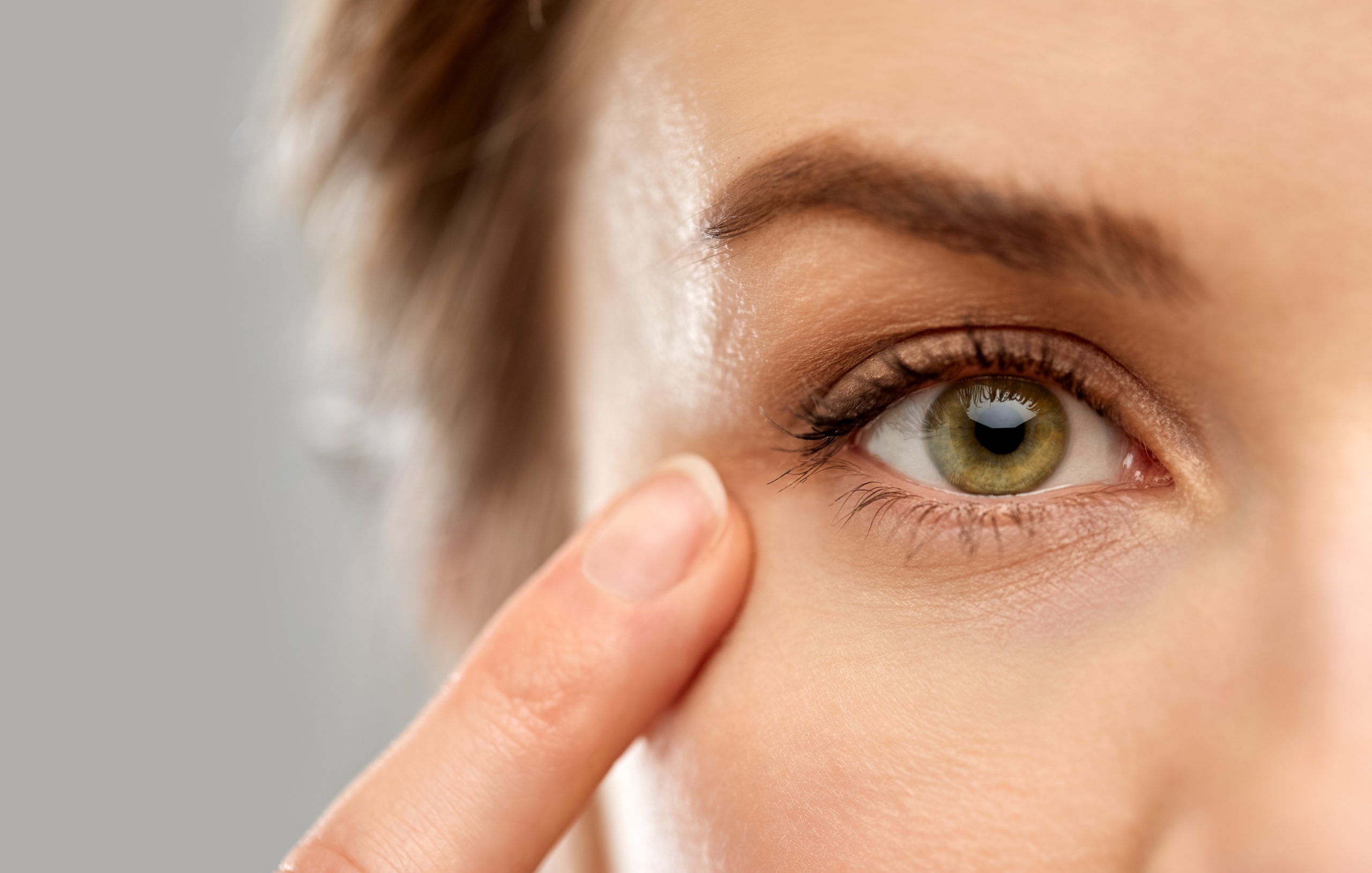
Help my eyelid is twitching!

Do you need to have eye exams after laser eye surgery?
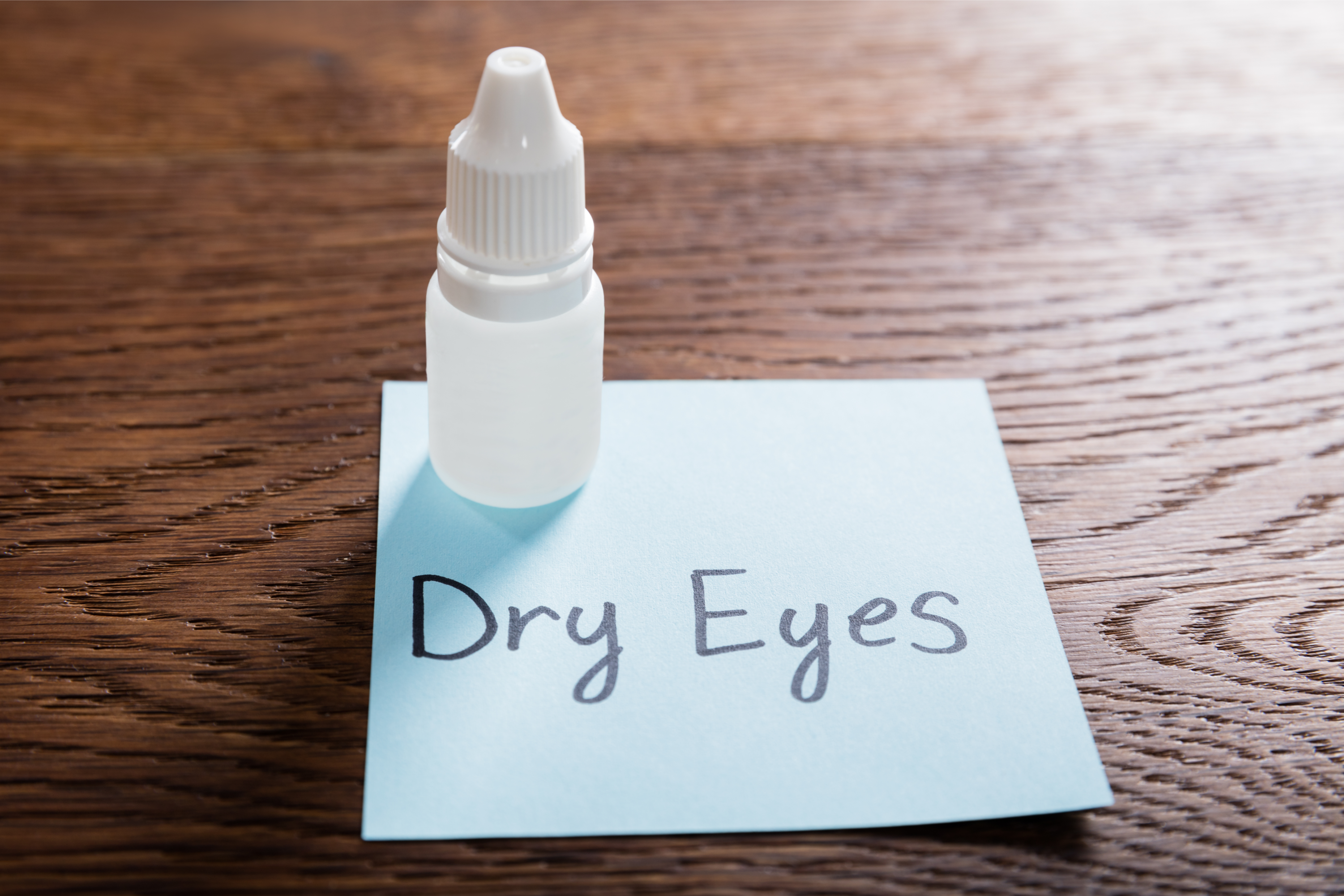
Restasis Eye Drops for the Treatment of Dry Eyes
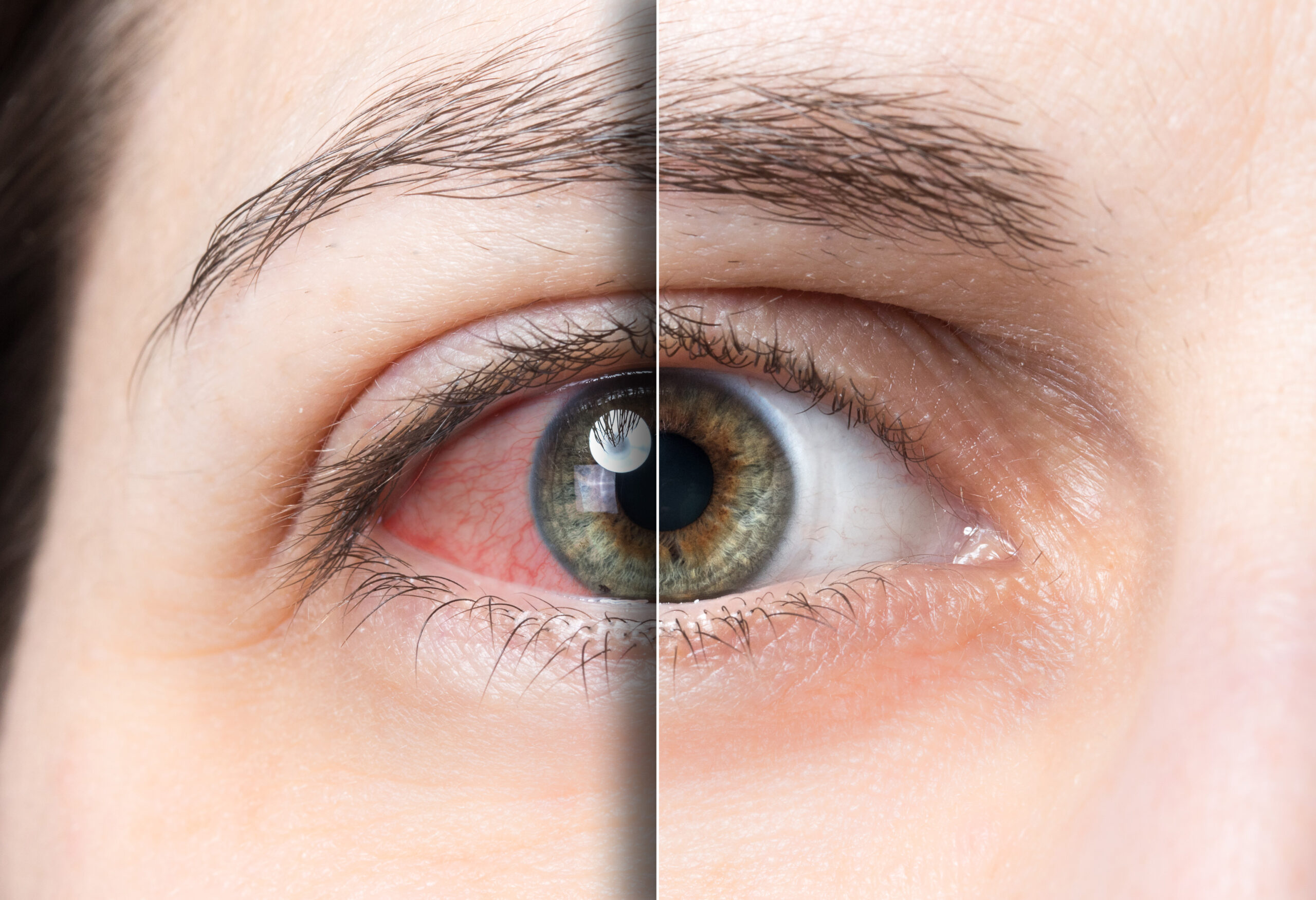
What is IPL? And how can it help dry eye?

Meet The Team at the Wellington Eye Centre

Festive Season and Your Eyes

Naumi Studio Hotel Wellington
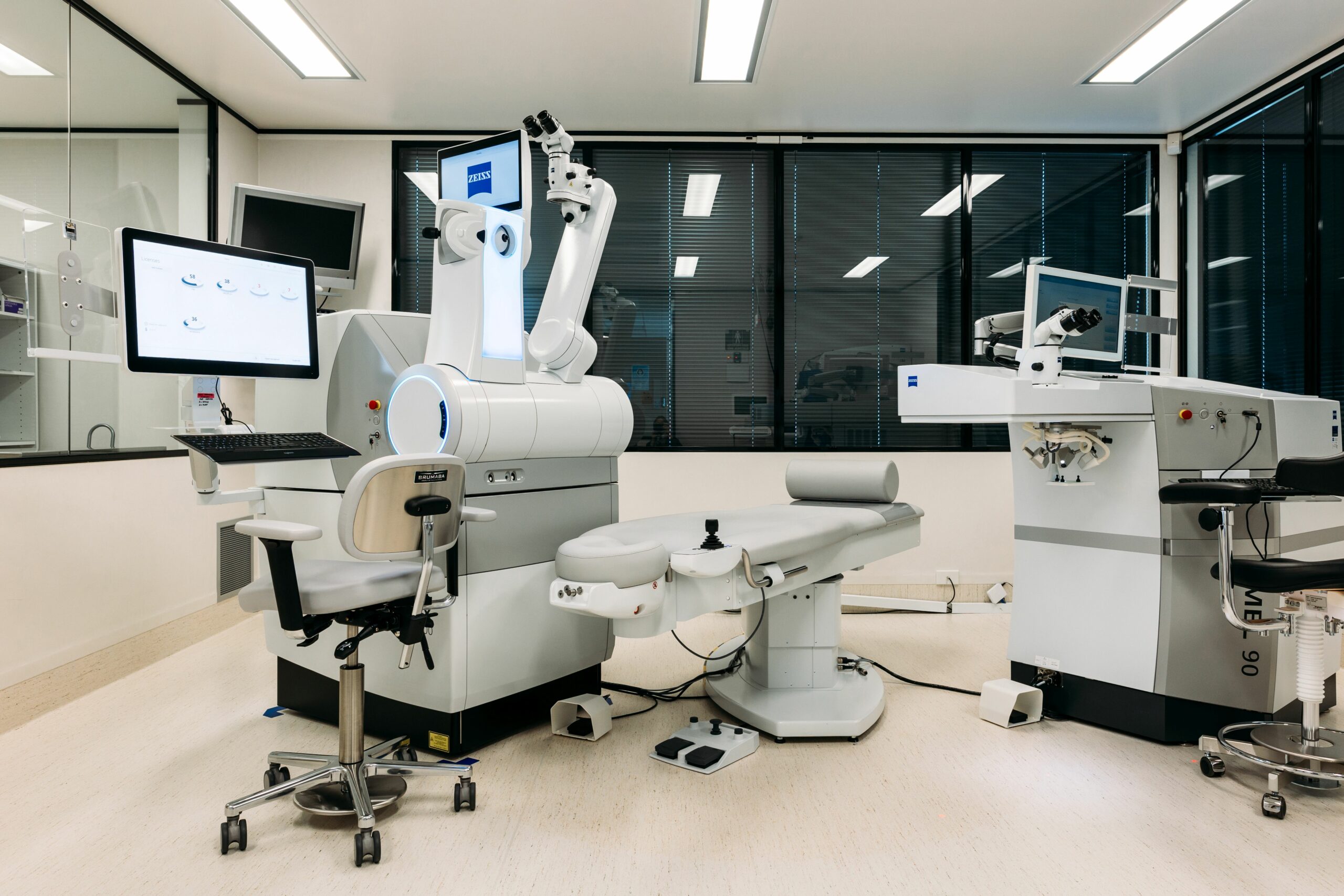
What to Expect on The Day of Surgery
